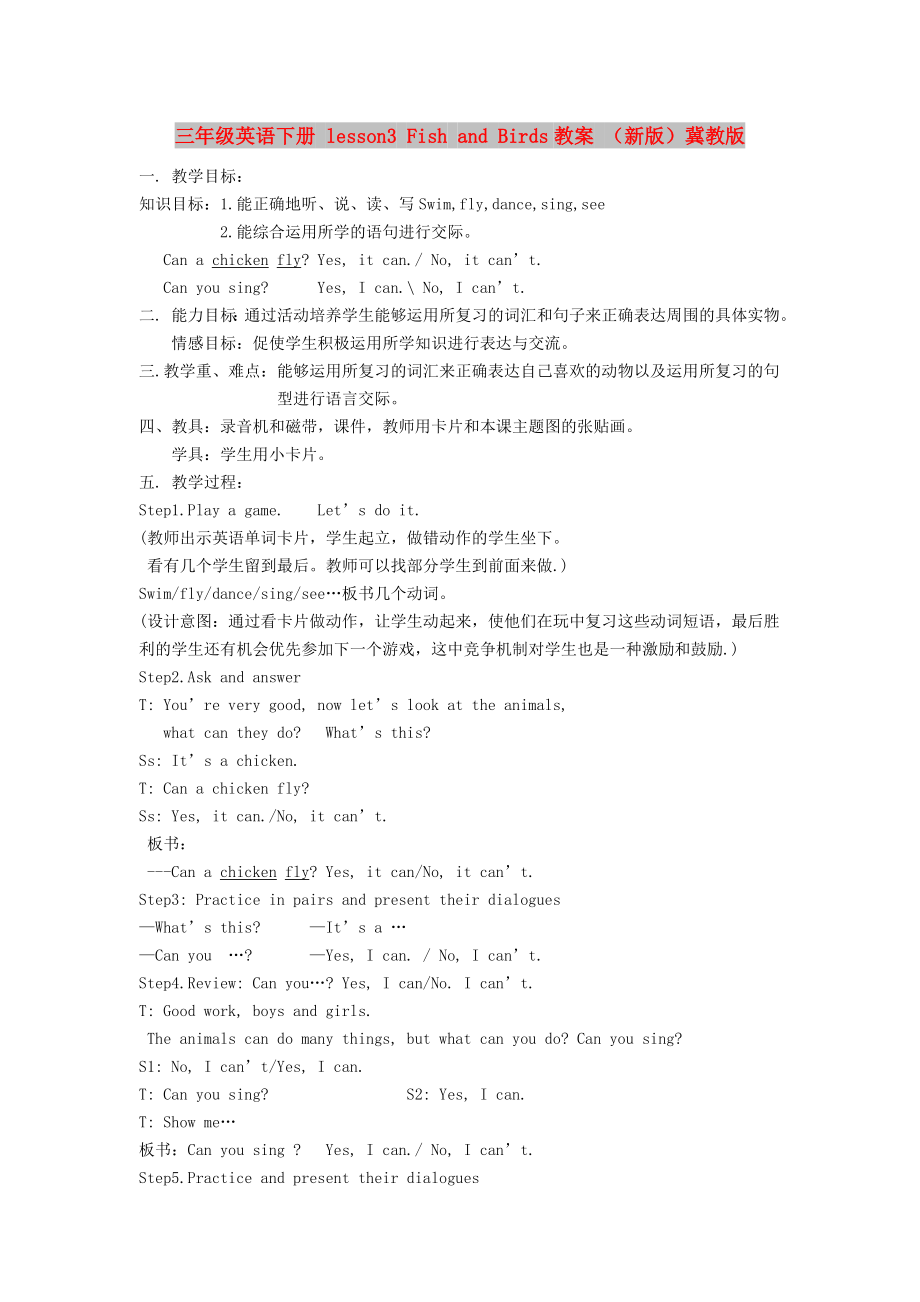《三年級(jí)英語(yǔ)下冊(cè) lesson3 Fish and Birds教案 (新版)冀教版》由會(huì)員分享����,可在線閱讀,更多相關(guān)《三年級(jí)英語(yǔ)下冊(cè) lesson3 Fish and Birds教案 (新版)冀教版(3頁(yè)珍藏版)》請(qǐng)?jiān)谘b配圖網(wǎng)上搜索�����。
1、三年級(jí)英語(yǔ)下冊(cè) lesson3 Fish and Birds教案 (新版)冀教版
一. 教學(xué)目標(biāo):
知識(shí)目標(biāo):1.能正確地聽(tīng)�、說(shuō)、讀�����、寫Swim,fly,dance,sing,see
2.能綜合運(yùn)用所學(xué)的語(yǔ)句進(jìn)行交際�����。
Can a chicken fly? Yes, it can./ No, it can’t.
Can you sing? Yes, I can.\ No, I can’t.
二. 能力目標(biāo):通過(guò)活動(dòng)培養(yǎng)學(xué)生能夠運(yùn)用所復(fù)習(xí)的詞匯和句子來(lái)正確表達(dá)周圍的具體實(shí)物���。
情感目標(biāo):促使學(xué)生積極運(yùn)用所學(xué)知識(shí)進(jìn)行表達(dá)與交流��。
三.教學(xué)重����、難點(diǎn):能夠
2�����、運(yùn)用所復(fù)習(xí)的詞匯來(lái)正確表達(dá)自己喜歡的動(dòng)物以及運(yùn)用所復(fù)習(xí)的句型進(jìn)行語(yǔ)言交際��。
四��、教具:錄音機(jī)和磁帶��,課件��,教師用卡片和本課主題圖的張貼畫����。
學(xué)具:學(xué)生用小卡片。
五. 教學(xué)過(guò)程:
Step1.Play a game. Let’s do it.
(教師出示英語(yǔ)單詞卡片����,學(xué)生起立,做錯(cuò)動(dòng)作的學(xué)生坐下�。
看有幾個(gè)學(xué)生留到最后。教師可以找部分學(xué)生到前面來(lái)做.)
Swim/fly/dance/sing/see…板書幾個(gè)動(dòng)詞��。
(設(shè)計(jì)意圖:通過(guò)看卡片做動(dòng)作��,讓學(xué)生動(dòng)起來(lái)��,使他們?cè)谕嬷袕?fù)習(xí)這些動(dòng)詞短語(yǔ)���,最后勝利的學(xué)生還有機(jī)會(huì)優(yōu)先參加下一個(gè)游戲�����,這中競(jìng)爭(zhēng)機(jī)制對(duì)學(xué)生也是一種激勵(lì)和鼓勵(lì).
3�����、)
Step2.Ask and answer
T: You’re very good, now let’s look at the animals,
what can they do? What’s this?
Ss: It’s a chicken.
T: Can a chicken fly?
Ss: Yes, it can./No, it can’t.
板書:
---Can a chicken fly? Yes, it can/No, it can’t.
Step3: Practice in pairs and present their dialogues
—Wh
4��、at’s this? —It’s a …
—Can you …? —Yes, I can. / No, I can’t.
Step4.Review: Can you…? Yes, I can/No. I can’t.
T: Good work, boys and girls.
The animals can do many things, but what can you do? Can you sing?
S1: No, I can’t/Yes, I can.
T: Can you sing? S2: Yes, I can
5�����、.
T: Show me…
板書:Can you sing ? Yes, I can./ No, I can’t.
Step5.Practice and present their dialogues
Can you dance? Yes, I can./ No, I can’t.(設(shè)計(jì)意圖:這五個(gè)步驟將動(dòng)物單詞和句型有機(jī)的結(jié)合在一起��,讓學(xué)生用英語(yǔ)談?wù)撍麄兿矚g的小動(dòng)物��,之后從談?wù)搫?dòng)物之中自然的過(guò)度到談?wù)撟约?���,培養(yǎng)學(xué)生語(yǔ)言綜合表達(dá)的能力。)
Ⅳ. Consolidation
Step1.Demonstrate
T: What’s this? S1
6��、: It’s a chicken.
T: Can a chicken fly? S1: Yes, it can.
T: Can you fly? S1: No, I can’t.
Step2. Take out the text paper and finish number 2.
(設(shè)計(jì)意圖:這幾個(gè)步驟設(shè)計(jì)的目的是從短語(yǔ)到句子��,即部分到整體循序漸進(jìn)����,創(chuàng)設(shè)真實(shí)的語(yǔ)言情境,讓學(xué)生把復(fù)習(xí)過(guò)的動(dòng)物和句型整合在一起����,以對(duì)話形式展示學(xué)生綜合表達(dá)的能力,同時(shí)�����,完成練習(xí)題二�,在學(xué)生能用英語(yǔ)對(duì)話的基礎(chǔ)上又考察了學(xué)生認(rèn)讀句子的能力。)
Ⅴ.Class
7����、 Closing
T: Are you happy? let’s chant !I can dance
六、板書:
Lesson 3 Fish and Birds
dance sing swim fly
Can a duck fly? Yes, it can.
No, it can’t.
附送:
2019-2020年三年級(jí)英語(yǔ)下冊(cè) lesson4 Horses and Rabbits教案 (新版)冀教版
?一. 教學(xué)目標(biāo):
知識(shí)目標(biāo):1.能正確地聽(tīng)���、說(shuō)��、讀���、寫animals, horse, yes,
8、 no.
2.能綜合運(yùn)用所學(xué)的語(yǔ)句進(jìn)行交際��。
Horse can run. Rabbits can jump. Can a horse run?
二. 能力目標(biāo):學(xué)生能說(shuō)出哪些動(dòng)物可以swim, jump, fly, run.
情感目標(biāo):促使學(xué)生積極運(yùn)用所學(xué)知識(shí)進(jìn)行表達(dá)與交流。
三.教學(xué)重�����、難點(diǎn):能夠運(yùn)用所復(fù)習(xí)的詞匯來(lái)正確表達(dá)自己喜歡的動(dòng)物以及運(yùn)用所復(fù)習(xí)的句型進(jìn)行語(yǔ)言交際�。
四、教具:錄音機(jī)和磁帶����,課件.
五. 教學(xué)過(guò)程:
Step 1、(1)Greeting:
Hello, boys and girls! How are you
9����、 today ?
?? (2)師生同唱“Old MacDonald Hand a Farm”�,(可以邊做動(dòng)作邊唱)
Step 2、引入課題:用張貼畫出示本課主題圖.
引導(dǎo)學(xué)生:What’s this? It’s a horse.
Step 3����、學(xué)生模仿讀音,找同學(xué)領(lǐng)讀�����,分組讀���。
依次學(xué)習(xí)Horse can run. Rabbits can jump.
Can a horse run?
鼓勵(lì)發(fā)音不標(biāo)準(zhǔn)的學(xué)生多練習(xí)幾遍��,至讀音標(biāo)準(zhǔn)���。
采用多種形式全班練習(xí),直至讀熟���。
?Step 4��、Game:(1)Quickly answer.(快速
10�、搶答)
??? (2)Guessing words.(猜動(dòng)物)
?Step 5���、小組之內(nèi)練習(xí)句子����。表現(xiàn)好的一組獎(jiǎng)勵(lì)金星�����。
What animals can fly ? Birds can fly.
?Step 6����、小組討論對(duì)本課內(nèi)容總結(jié)匯報(bào)�����,完成《活動(dòng)手冊(cè)》���,練習(xí)
完成寫單詞的部分。
Step 7����、Class Closing
T: Are you happy? Now, let’s sing a song.
六、板書 :
Lesson 4 Horses and Rabbits
?animals, horse, yes, no.
swim, jump, fly, run.
Horse can run. Rabbits can jump.
Can a horse run?
What animals can fly ?
Birds can fly.
 三年級(jí)英語(yǔ)下冊(cè) lesson3 Fish and Birds教案 (新版)冀教版
三年級(jí)英語(yǔ)下冊(cè) lesson3 Fish and Birds教案 (新版)冀教版

